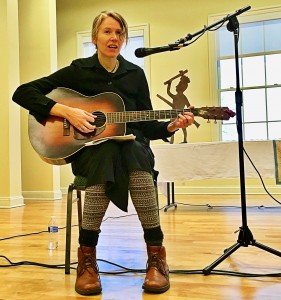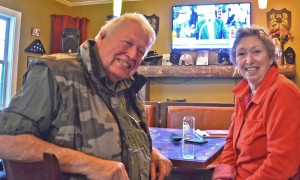What’s a good life?
Yeats said, “It’s an Irish curse, to dream things the world has never seen.”
Joe Keating dreamed things and fought to make those imaginings a reality, stimulated by an expansive curiosity, by his gift to tell a story, and joy at tapping out an apt phrase or declamation, motivated by his love of others, and his many passions, and in this way, he enriched not only his own life but those around him.
Joe was a bear of a man, strong physically, with a broad smile, a kind word and a great hug for friend and stranger alike.
Cate Magennis presided over a celebration of Joe’s life this past Saturday. In preparation for the gathering, Cate asked Joe’s wife and partner in so many adventures for 35 years, his Jo Ellen, what might be Joe’s favorite scripture. Joe Ellen simply rolled her eyes in reply.
A great crowd gathered at the Waterford School at the top of the Hill, in the Town where Jo and Jo Ellen and their family made their home, in a small historic building, just up the road from the Mill.
Joe enjoyed sitting in a chair at the back of that old house looking at the flowing waters of the Catoctin Creek.
Joe’s once brother in law, and still his brother by choice and affection, said, “Joe was the richest man on the barest means.”
At one of those sittings no doubt, Joe wrote, “The deer along the Catoctin are moving out of the creek bed as the sun sets. They are outlined against the water that flows like molten silver in the darkening fields of Phillips farm.”
Cate recalled a man of character who attended West Point, UVA, served in World War II, worked at NOAA, and was devoted “to righting the injustices he saw.”
Guests left tracks in the snow to attend this celebration, braced against the chill, blinking into the flakes of falling snow, arriving from afar, from Florida, North Carolina, Georgia, and, of course, closer to home, from across the County and that contingent of neighbors and friends who walked the familiar streets of Waterford Town.
Joe wrote often of his hometown: “Waterfordians and Loudouners have plenty to be thankful for,” Joe wrote, “living in a place not only of such outstanding scenery but, as thus inspired, where craftsmen and artisans have and continue to produce things of usefulnesss, and, with form following function, beauty.”
Seneca wrote, “it’s not that life is too short, it is that much of it is wasted.”
Joe had not wasted a day of his 80 years when he passed on January 12th .
There were friends and allies who attended, spread over the years of Joe’s active political life in the Democratic party. There were past and present leaders, elected officials, and candidates, and foot soldiers in the many political campaigns that Joe joined when he didn’t lead the charge. Jo Ellen was always at his side, and Joe at her side when this tall wonderful lady took charge.
Like a mirror to the man, there were those in attendance who cared about conserving and preserving and loving nature, and studying and re-enacting history.
One said that “sword swallowing was what you do if you’re not very well read.” There was no record of Joe attempting to swallow a sword.
Children gathered about Joe as Santa Claus because for years at Cate’s home a bell would ring on a December evening, and Santa revealed himself amid young-uns asking, “Do you have a gift for me.”
A “benign and gentle” Joe asked each child, have you been good or bad, and recorded the response for the next year’s “review.”
One of Joe’s daughter, Kristin, said her Dad taught her to tell stories. She told how he loved screen doors slamming, children running and laughing, how he taught her to appreciate nature, to throw the sunfish back, to eat honey combs, to buy used cars, though Joe once bought a new Ford Pinto (proving used was better – since the Pinto had an inclination to explode).
Joe encouraged “unconventional” vacations, she said, and rolling down the dunes of Kitty Hawk, picking up strangers, discovering what was transgender in these travels, and accepting everyone for who they were.
She was a Princess in her Dad’s eyes, and she loved that her Dad loved that she married “a polish guy,” though she didn’t know if it was for the Polish beer.
Kathy Fahey sang a heartfelt song to conclude the formal program.
Words lingered in the air, filling the quiet, as if the final silence, when all had been said, would separate the living once and for all from Joe.
But then the crowd arose from their seats, embraced each other, and many went to the nearby kegs, to lift a beer in Joe’s memory and to trade a story – a living memory –just as Joe would have had it.





